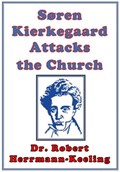Dr. Herrmann-Keeling presents a scholarly volume on the life and work of Danish philosopher-theologian Soren Kierkegaard, founder of modern Existentialism. Childhood influences on his later attitudes and actions are explored, as is his relationship with his depressed father. We see how his love-hate relationship with the official Danish Lutheran Church led to attack it as “making a fool of God.” He compares the church of his day with the first generation church, and proclaims that Christianity no longer exists. A chapter-by-chapter synopsis follows:
Chapter 1: The Melancholy Dane – A summary of Kierkegaard’s life including quotations from his voluminous journals. We see how the stage is set for his last years, in which he attacks the church as “making a fool of God.”
Chapter 2: Methodology in his Madness – Kierkegaard’s dialectical method is explained, along with contemporary and biblical influences on his thoughts and writings.
Chapter 3: Categories of his Works – Psychological, Literary, Philosophical, and Religious categories are explored as both outside influences on his thinking and his written works, and inner, personal ways he viewed his own world.
Chapter 4: Christendom and Christianity – Two major books, his journals, and articles are examined to show Kierkegaard’s growing disaffection with the Danish church and his decision that only Christendom (the corrupt earthy establishment) exists, and true Christianity does not. His attack on the church is cut short by his untimely death at age 42.
Chapter 5: A Life of Jesus –Kierkegaard contrasted the church of his day with his interpretation of first-generation Christianity, so we look at origins. This chapter provides a detailed outline of the life of Jesus, on whose person and message the first church was based.
Chapter 6: The First Generation Church – A description of the first generation church is given, based on known history and on the events recorded in the New Testament, especially the book of Acts and the letters of Paul.
Chapter 7: Kierkegaard Speaks to Christendom Today – This chapter summarizes several of Kierkegaard’s main topics as he asks if the present church can be called Christian, if it can be reformed to ring it more into line with its origins, and how such a reformation can be made in terms of such features of the church as Baptism, Communion, and Confirmation; preaching the gospel; Worship; and finally “contemporaneousness with Christ.”
Final Remarks – The author asks if Kierkegaard’s message is relevant for today’s institutional church, and leaves it to the reader to decide.
Bibliography– More than forty resources are listed to help the reader learn more about all the issues raised in this eBook.
About the author: The author is an ordained minister in the United Church of Christ and an Adlerian psychologist, and is currently the director of the LifeCourse Institute of Adlerian Psychology. He has four graduate degrees, with specializations in ministry, philosophy, New Testament theology, and Adlerian psychology. He is currently the director of the LifeCourse Institute of Adlerian Psychology.

